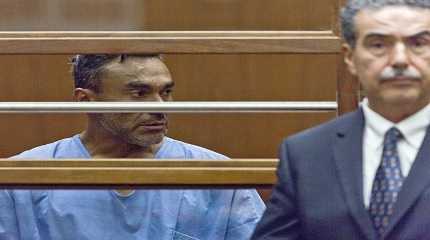
LOS ANGELES (AP) — A man who pleaded guilty to a series of Southern California attacks that killed five men and injured seven others was sentenced Friday to life in prison without possibility of parole.
Ramon Escobar, 50, received multiple life sentences after entering guilty pleas to murder with special circumstances and attempted murder. In a Zoom call hearing, he also pleaded guilty to the 2018 killings of his aunt and uncle in Houston, Texas. He received additional life sentences for those slayings but will serve them consecutively in California.
Prosecutors said Escobar fled Texas after killing his relatives and was homeless when he began attacking people in Los Angeles and Santa Monica over the course of about two weeks in September 2018.
Prosecutors said Escobar bludgeoned victims with bolt cutters or a baseball bat as they lay sleeping on streets or the beach. All but one were homeless.
In an interview with police, Escobar said he killed some of the victims because they “irritated him, they were disrespectful to law enforcement, or he robbed them because he needed money,” according to a prosecution sentencing memorandum.
Surveillance video showed him ransacking the pockets and belongings of some victims in downtown Los Angeles.
Escobar had fled Texas after being questioned over the disappearance of his aunt and uncle, with whom he’d been staying. He drove 1,500 miles (2,414 kilometers) to California, arriving about a week before the attacks began there, authorities said.
Houston police later said Escobar confessed that he had killed siblings Dina Escobar, 60, and Rogelio Escober, 65.
Escobar told police he beat his uncle to death because he felt disrespected, and then killed his aunt after hiding in her van when she went to look for her brother two days later.
Escobar said he left the bodies in two different dumpsters, and they were later found at a landfill.
Escobar had a previous criminal record that included a five-year prison term for burglary in Texas and misdemeanor convictions for assault and trespassing, authorities said.
Escobar, who originally was from El Salvador, also had been deported six times from 1997 to 2011 but returned illegally, authorities said. In 2017 he was released from federal immigration custody after winning an appeal of his latest deportation case in an immigration court, according to U.S. Immigration and Customs Enforcement.




